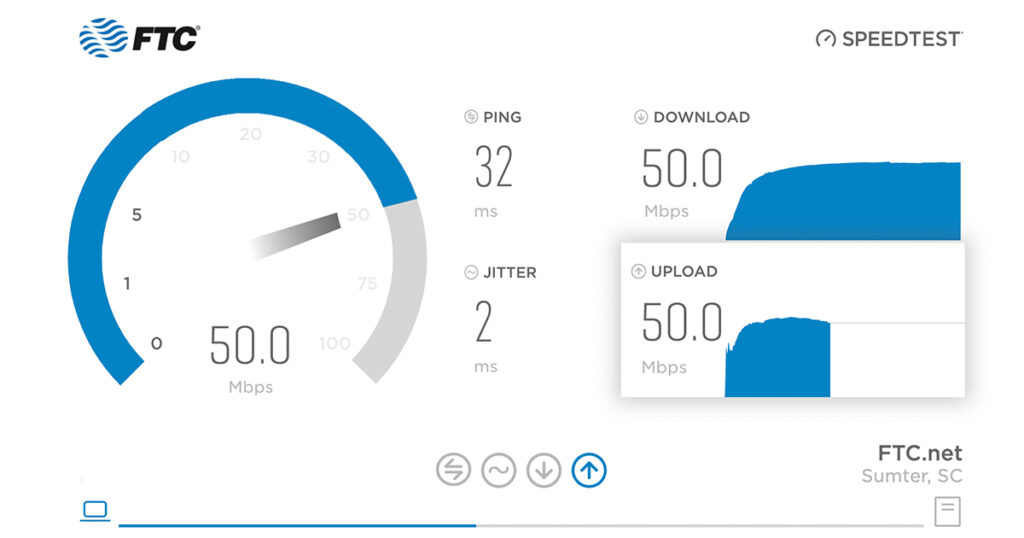For most homes, a good download speed is between 50 Mbps and 250 Mbps, depending on the number of devices simultaneously in use. A 250 Mbps connection allows a family of four to stream TV, movies and games on multiple devices while using video conferencing, like Zoom, all at the same time. A speed of 50 Mbps is better suited for couples or individuals without competing streaming demands.
What Is a Good Upload Speed?
A good upload speed on an asymmetrical connection, like cable, is 5 Mbps, while a good upload speed on a symmetrical fiber connection is 250 Mbps, or as high as your download speed is measured. At 5 Mbps, you can upload large audio and video files in minutes and maintain a high-quality video call. A 250 Mbps symmetrical upload speed allows simultaneous uploads of large files in seconds while video chatting and video game streaming is occurring throughout the house. Many families find it difficult to push a 250 Mbps upload speed to its limits.
What Are the Best Residential Download and Upload Speeds?
Currently, the best download and upload speeds available to the widest markets are symmetrical 1 Gb download and 1 Gb upload speeds. These speeds exceed the needs of most households but are a welcome improvement in homes with very high download and upload demands.
Uploads vs. Downloads
The download is the loading of a file onto an in-house device from another device or database connected to the web. It is done via the transmission of data over the device’s internet connection. The downloading process gives users access to a virtual world of outside data and files, all without the need for huge amounts of storage space.
Alternatively, the upload is the information a user enters into a browser to perform a web search. Before the device can download any search results, the search-query terms must be uploaded to the web, where a search engine uses this digitally submitted information to provide its subsequent search results back to the browser.
The upload is performed when the user’s device submits information or files to the web. It is worth noting that, in this case, the amount of information being uploaded during the web search is fairly minimal as it usually amounts to just a few words. Upload sizes, however, can increase significantly when a user is, for example, making a video call for which the user’s device must continually upload the video and audio from the user’s end of the call.
Why Are Fast Download and Upload Speeds Important?
An internet connection with a strong download speed helps a user’s device get the information or file it needs from the web more quickly. Once more users are added to the equation, a fast download speed allows all users to download data without affecting other users’ speeds. When the amount of data being downloaded simultaneously meets and exceeds the subscribed download speed, all users’ downloads are slowed.
While perhaps not as frequently noticed by the user, fast upload speeds also help to facilitate a good user experience, especially when the user is participating in upload-heavy activities such as videoconferences or online calls. In these cases, a fast upload speed will result in a smooth user experience while an inadequate upload speed will result in other participants being unable to hear or see the user. Or the user’s feed on other participants’ devices end up being choppy or even incomprehensible.
FTC Speed Test
Want to know how fast your upload and download speeds are? Take the FTC Speed Test to find out!
FTC Speed Calculator
What is the right internet plan for you and all of the internet-connected devices in your home? Use the FTC Speed Calculator to find your ideal internet speed.
Get Connected
Need a fast and reliable internet connection along with fast upload and download speeds to keep all of your online devices running smoothly? Explore the range of rates and blazing-fast internet packages available from FTC Internet.




